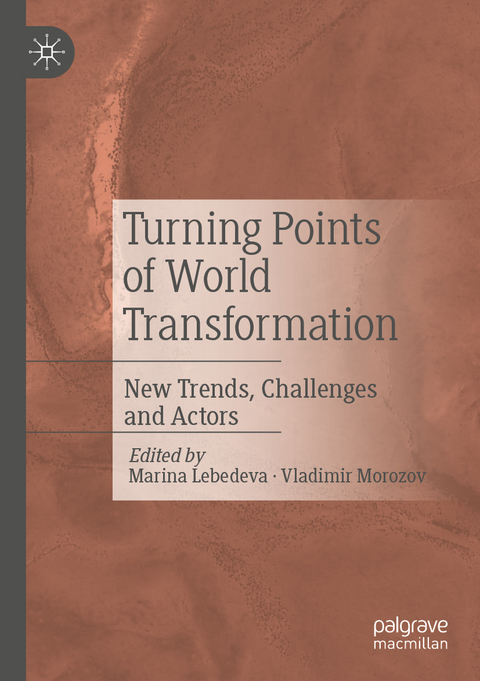
Turning Points of World Transformation
Palgrave Macmillan (Verlag)
978-981-19-1760-8 (ISBN)
This book explores the transformation of the political organization of the world as manifest in different spheres of world politics, in particular, in world politics, regional studies, interaction of MNCs and government agencies, and state responses to biogenic challenges. To achieve this goal, M. Lebedeva proposes the concept of a political organization of the world, which in modern conditions is in the process of transformation. The transformation of the political organization of the world is accompanied by megatrends (globalization, integration, democratization) and the opposite trends (de-globalization disintegration, dedemocratization). Interdisciplinary in nature, this book brings together scholars from Russia, the United States, and Canada, and provides a compelling perspective on the geopolitics of our time.
Marina Lebedeva graduated from the Moscow State University, 1977, received her PhD in 1981 and became Doctor of Political Science in 1993. She is the head of the World Politics Department, Moscow State Institute of International Relations (MGIMO-University). Marina Lebedeva is author and co-author of more than 400 academic publications, including books. Vladimir Morozov is Associate professor at the Department of Diplomacy and holds the position of Vice-President for HR. He has a PhD in History and has been working at MGIMO since 2002 with a short break in 2004–2007 when he was assigned to the Embassy of the Russian Federation to Israel.
lt;b>Chapter 1. IntroductionPart I. Non-state actors in state-centrist Westphalian system
Chapter 2. V.Morozov. NGOs in the Middle East
Chapter 3. Smart City - A Global Project of Late Capitalism
Chapter 4. Failed Arab States: Interaction of Non-State Actors and State Structures
Chapter 5. The Origin, Present State, and Future f Multipolarity from a Connectivity Perspective
PART II. Trends in interstate relations in modern world politics
Chapter 6. Significant Improvement in Relations between Russia and Japan, and Why There Was no Breakthrough
Chapter 7. Theoretical Perspectives on BRICS: What Kind of an International Institution?
Chapter 8. Russia and the Arctic Council: towards a new cooperative agenda?
Chapter 9. The UN And the Middle East Settlement - Mission: Impossible
PART III. States in the Transforming Political Organization of the World
Chapter 10. Biopolitical Challenges for the World
Chapter 11. The COVID-19 Health Scare and Its Impact on the US Politics and Society.
Chapter 12. Spatial development, Regional Policy, and the Modern World Politics.
Chapter 13. Alternative für Deutschland and the Origins of the German Sonderweg
Chapter 14. The Rise of Euroscepticism in Europe in Time of Crisis
| Erscheinungsdatum | 20.06.2023 |
|---|---|
| Zusatzinfo | 3 Illustrations, color; 2 Illustrations, black and white; XV, 249 p. 5 illus., 3 illus. in color. |
| Sprache | englisch |
| Maße | 148 x 210 mm |
| Themenwelt | Sozialwissenschaften ► Politik / Verwaltung ► Europäische / Internationale Politik |
| Sozialwissenschaften ► Politik / Verwaltung ► Politische Theorie | |
| Sozialwissenschaften ► Politik / Verwaltung ► Vergleichende Politikwissenschaften | |
| Schlagworte | Arctic council • Biopolitics • BRICs • Covid • Euroscepticism • Middle East • Political organization of the world • Smart City • World Politics |
| ISBN-10 | 981-19-1760-4 / 9811917604 |
| ISBN-13 | 978-981-19-1760-8 / 9789811917608 |
| Zustand | Neuware |
| Haben Sie eine Frage zum Produkt? |
aus dem Bereich


